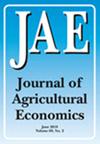Private or Public? Farmer Preferences and Identities in Agri‐Environmental Contract Implementation
IF 4.2
2区 经济学
Q1 AGRICULTURAL ECONOMICS & POLICY
引用次数: 0
Abstract
This study investigates farmer preferences for publicly and privately financed agri‐environmental contracts. Using a labelled Discrete Choice Experiment with 366 German grassland farmers, we examine trade‐offs between payment schemes (public/private), payment criteria (practice‐based/result‐based), collaboration options, and advisory services. Our results show that farmers require higher compensation for privately financed contracts compared to public ones. On average, respondents prefer practice‐based over result‐based payments and value free advisory services, particularly in private schemes. Preferences for collaborative implementation indicate a strong desire for autonomy. A key contribution of this study lies in integrating farmer identity into the analysis. Drawing on a psychometric scale of ‘good farmer’ attributes, we identify three latent identities—productivist, environmentalist and civic‐minded—and show that these significantly explain heterogeneity in preferences and land enrolment decisions. Productivist farmers demand higher compensation and commit less land, while environmentalist and civic‐minded farmers are more inclined to participate and enrol larger areas, even at lower compensation levels. These findings highlight the importance of tailoring agri‐environmental contracts to farmers' identities through for example framing of agri‐environmental contracts accordingly. Privately financed schemes, such as those based on crowdfunding platforms, must address perceived risks, offer advisory support and develop communication strategies that resonate with different identity profiles. Recognising farmer identity as a behavioural driver can enhance participation in both public and private agri‐environmental schemes and inform more effective contract design.私人还是公共?农业环境契约实施中的农民偏好与认同
本研究调查了农民对公共和私人资助的农业-环境合同的偏好。通过对366名德国草原农民进行标记离散选择实验,我们研究了支付方案(公共/私人)、支付标准(基于实践/基于结果)、合作选项和咨询服务之间的权衡。我们的研究结果表明,与公共合同相比,农民对私人融资合同的补偿要求更高。平均而言,受访者更喜欢基于实践而不是基于结果的支付和价值免费的咨询服务,特别是在私人计划中。对协作实现的偏好表明了对自主性的强烈渴望。本研究的一个关键贡献在于将农民身份纳入分析。利用“好农民”属性的心理测量量表,我们确定了三种潜在的身份——生产主义者、环保主义者和公民意识——并表明这些显著地解释了偏好和土地登记决策的异质性。生产主义的农民要求更高的补偿,并承诺更少的土地,而环保主义者和公民意识的农民更倾向于参与和登记更大的区域,即使在较低的补偿水平。这些发现强调了根据农民的身份定制农业-环境合同的重要性,例如通过相应的农业-环境合同框架。私人融资计划,如基于众筹平台的计划,必须解决感知到的风险,提供咨询支持,并制定与不同身份群体产生共鸣的沟通策略。认识到农民身份是一种行为驱动因素,可以提高公众和私人农业环境计划的参与度,并为更有效的合同设计提供信息。
本文章由计算机程序翻译,如有差异,请以英文原文为准。
求助全文
约1分钟内获得全文
求助全文
来源期刊

Journal of Agricultural Economics
管理科学-农业经济与政策
CiteScore
7.90
自引率
2.90%
发文量
48
审稿时长
>24 weeks
期刊介绍:
Published on behalf of the Agricultural Economics Society, the Journal of Agricultural Economics is a leading international professional journal, providing a forum for research into agricultural economics and related disciplines such as statistics, marketing, business management, politics, history and sociology, and their application to issues in the agricultural, food, and related industries; rural communities, and the environment.
Each issue of the JAE contains articles, notes and book reviews as well as information relating to the Agricultural Economics Society. Published 3 times a year, it is received by members and institutional subscribers in 69 countries. With contributions from leading international scholars, the JAE is a leading citation for agricultural economics and policy. Published articles either deal with new developments in research and methods of analysis, or apply existing methods and techniques to new problems and situations which are of general interest to the Journal’s international readership.
 求助内容:
求助内容: 应助结果提醒方式:
应助结果提醒方式:


